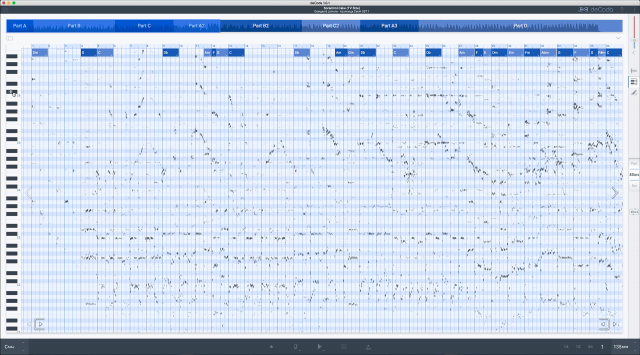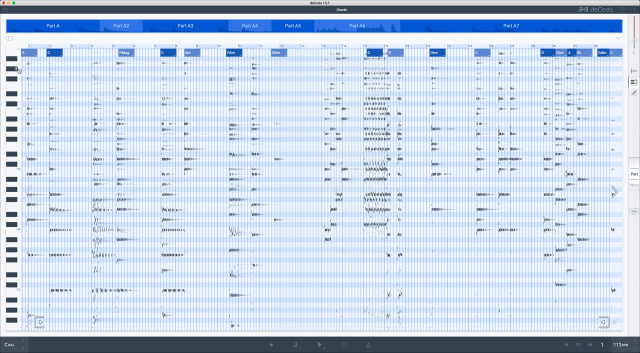zplane claims that its deCoda is “… the tool for music practicing, transcription and instrument practice. deCoda can decode any song so the user can learn to play it in minutes.” I thought I’d check it out.
It had little trouble with simple stuff harmonized with triads, e.g., plain arrangements of Celtic tunes. It seemed to recognize only four types of chords, though: major, minor, augmented and diminished. Sevenths were absent.
I gave it Masumi Itou’s “Soramimi Cake,” the opening of Azumanga Daioh1 and a memorable, quirky tune.
As deCoda sees it:
It looks reasonably close, catching the C / D♭ seesaw. However, there are still just four types of chords. I wonder just how sophisticated the “advanced chord and tempo detection algorithms” are. (Here’s a piano transcription of the tune for comparison, and a video with a cutesy animated score.)
Here’s a brief collection various types of chords.
In order, there is a basic G7 to C cadence; Scriabin’s “mystic chord,” first arpeggiated and then up an octave; C6/9, first with the notes spaced out and then condensed in a high octave; the “Tristan” chord, the second time as it appeared in a Beethoven piano sonata; the “Petroushka” chord[s], followed immediately by the “Symphony of Psalms” chord; the “Elektra” chord; the “μ” chord popularized by Steely Dan; and the four sus4 chords Ron Jarzombek based “Suspended on All Fours” on.
And deCoda flunks the test. Once again, all it sees are the four basic triads. It misses the seventh of G7. It calls the mystic chord (C, F♯, B♭, E, A, D) a “C” when it’s arpeggiated and an “F#” when it’s not. It gets partial credit for calling the C6/9 “C” or “Am,” since it contains both triads. Calling the Tristan chord (F, B, D♯, G♯) “Fdim” is close but not quite right. It’s at best a quarter-right on the Petroushka chord, first labeling it as “D#dim, then catching the C triad but ignoring the F# one. I was surprised that it got the Psalms chord wrong; it’s just an Em triad with the G’s emphasized, but Stravinsky’s eccentric voicing fooled the algorithm. It’s at best half-right on the Elektra chord (E, B, D♭, F, A♭), which does include the notes of D♭m, but there’s more to it than that. deCoda missed the added ninths of the Steely Dan2 chords and the suspensions of Jarzombek’s.
I was interested to learn that silence, as in the penultimate measure of the test, is a G diminished chord.
So, is deCoda worthwhile? If you have a well-trained ear, no. Otherwise, it might be a useful tool if sheet music for the tunes you are interested in is hard to find, and the music is not too complex.


